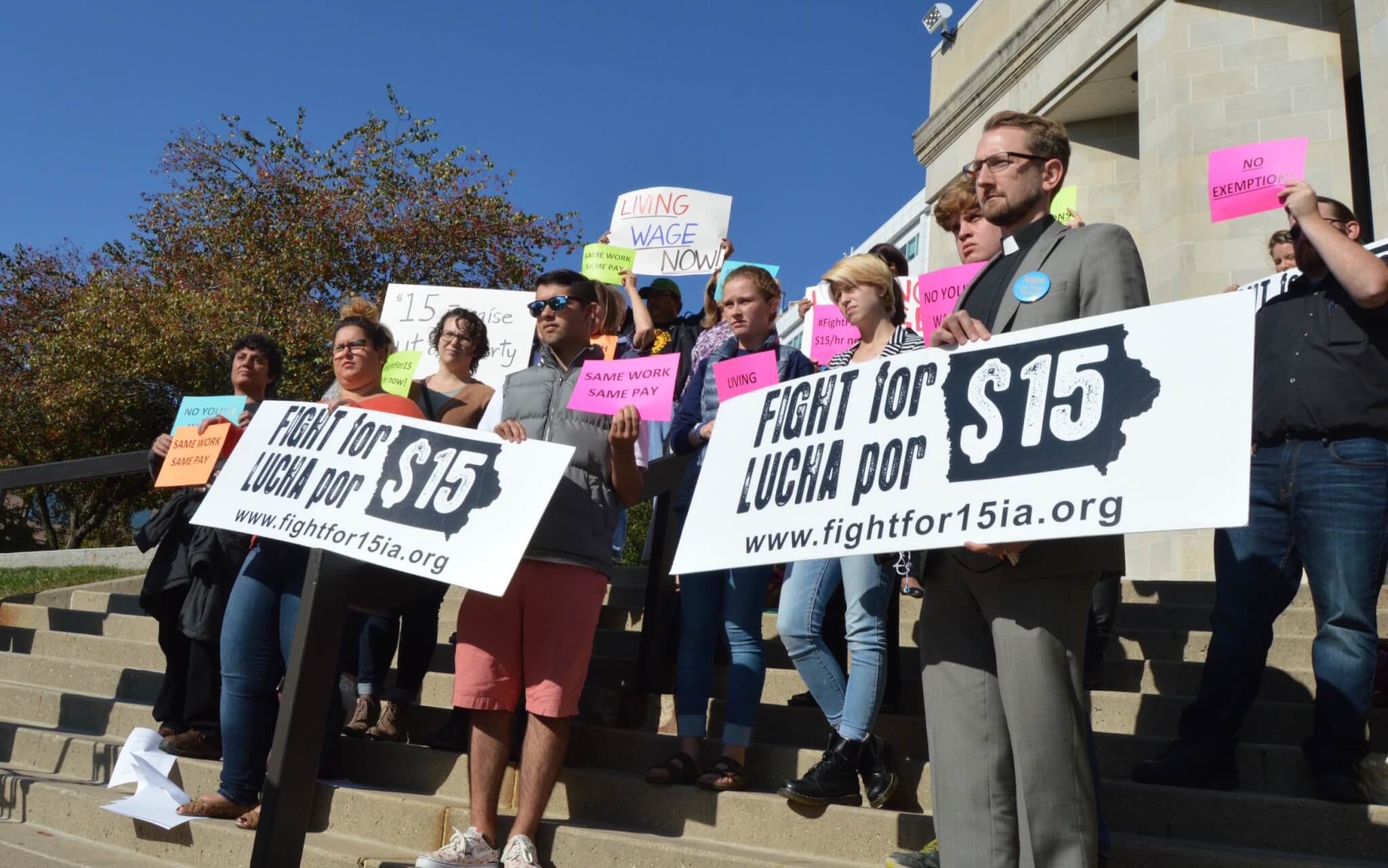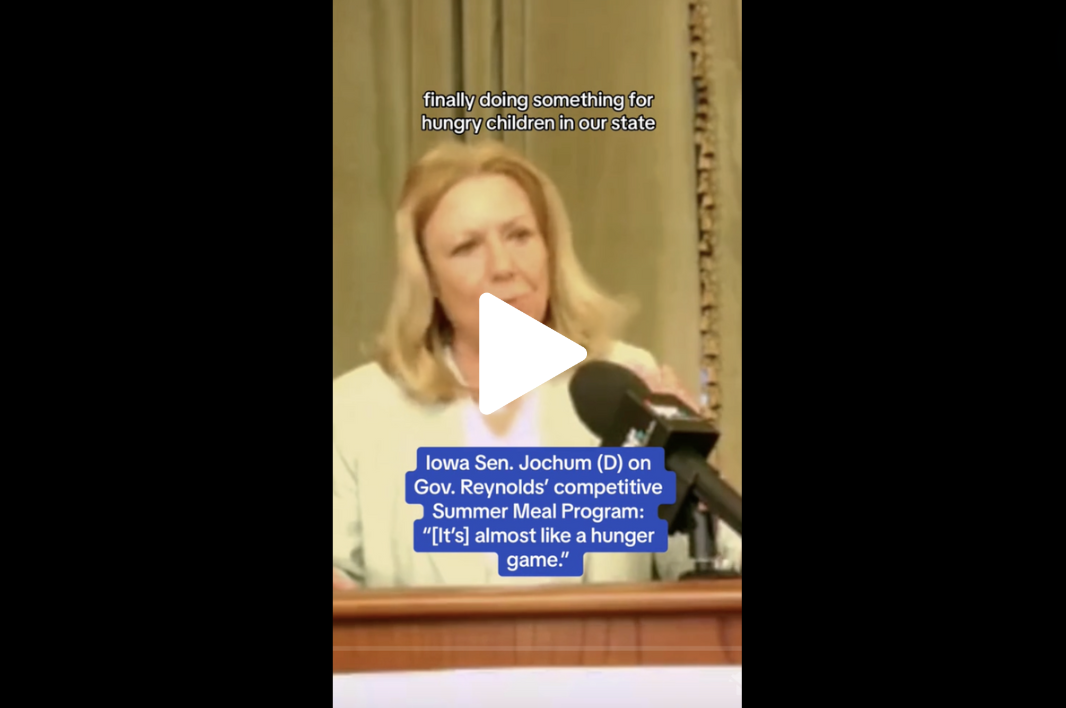
The consequences of the outcomes in Iowa’s many competitive state legislative races grew ever greater today, following Governor Terry Branstad’s remarks at his morning press conference. Branstad said he didn’t like the developing “hodge podge” of separate minimum wage laws, and suggested the Iowa Legislature take up the issue in 2017.
With that it appears activists and elected officials’ efforts (some successful, some not) to raise the minimum wage in Linn, Johnson, Polk, Lee, Wapello and Woodbury counties have succeed in one of their main goals: pressure the state legislature into action. Many believed that by creating a patchwork of varying minimum wages around the state – some even varying by municipality within one county – that it would spur the legislature to finally raise the statewide wage. Some business interest groups began to say they would rather have a higher statewide minimum wage than a collection of different ones, which adds complexity to their operations.
What that discussion looks like next year, and what a final minimum wage deal might entail, will depend heavily on how many seats each party controls after the November election. A Republican-held House and Senate would almost certainly make the smallest of improvements to the minimum wage, if that. Branstad said at his press conference that a $15/hour wage simply wasn’t realistic.
A key part of the negotiations will likely center around whether an increase is indexed to inflation – a major centerpiece of living wage proponents. More Democrats in the House and Senate would make that a priority. There might also be consideration of youth wages and exemption of tipped wage workers, like was included in the final Polk County measure that passed. More Republican legislators will mean more exemptions like those that lessen the impact of a minimum wage increase.
“House Republicans have stalled progress on the minimum wage for years and voted against it again just last year,” House Minority Leader Mark Smith said in a statement. “The only way to raise the minimum wage for hard working Iowa families who deserve it is to elect a Democratic majority in the Iowa House.”
There was early skepticism from many on the left over Branstad’s sincerity on working on the issue.
“Governor Branstad has provided no help as Senate Democrats have worked to increase the minimum wage for the first time since 2007,” said State Senator Rob Hogg. “He has stood by silently as we have tried to keep up with Nebraska, South Dakota, and other neighboring states. If Iowans want to raise the minimum wage, we need to elect Democrats to the Iowa state legislature.”
Others figured it to be a political move to save endangered GOP candidates whose campaigns are sinking thanks to Donald Trump’s implosion.
“I think it’s a political ploy to try to show that Repubicans have an ounce of compassion for the lowest hourly workers in the state,” said State Senator Tony Bisignano. “The Republican House refused to allow debate this past session and one Senate Republican voted for the Senate bill. Maybe they are feeling the pressure in the close races and want some cover.”
But some were a little more hopeful that the Governor might actually be open to working on an effort to improve working Iowans’ lives.
“It’s nice to hear the Governor finally address issues of working Iowans,” said State Representative Todd Prichard.
At $7.25, Iowa has the lowest minimum wage of any surrounding state, even Missouri. Activists in border cities like Sioux City have pointed to that disparity, noting it hurts Iowa businesses who lose out on good workers.
With Polk County setting the highest minimum wage in the state at $10.75 (implemented over three years), any amount set by the legislature lower than that would effectively be a vote for lower wages for some Iowans. Since the Polk County wage isn’t set to be voted on by the local municipalities until April of next year, how the legislators craft a statewide minimum wage bill could seriously impact whether or not it moves forward. That delay was intentionally done in order to see whether legislators will act.
The minimum wage debate will likely play out for several months during next year’s session, but the real factor in how high the wage will be set at will be determined during the next two weeks in swing legislative districts across Iowa.
by Pat Rynard
Posted 10/24/16
Politics

Biden marks Earth Day by announcing $7 billion in solar grants
The Biden administration on Monday announced the recipients of its Solar For All Program, a $7 billion climate program that aims to lower energy...

6 terrifying things that could happen if the Comstock Act is used to target abortion
Does 1873 sound like a really, really long time ago? Well, that’s because it is—but if Republicans and far-right anti-abortion activists have their...
Local News

No more Kum & Go? New owner Maverik of Utah retiring famous brand
Will Kum & Go have come and gone by next year? One new report claims that's the plan by the store's new owners. The Iowa-based convenience store...

Here’s a recap of the biggest headlines Iowa celebs made In 2023
For these famous Iowans, 2023 was a year of controversy, career highlights, and full-circle moments. Here’s how 2023 went for the following Iowans:...





